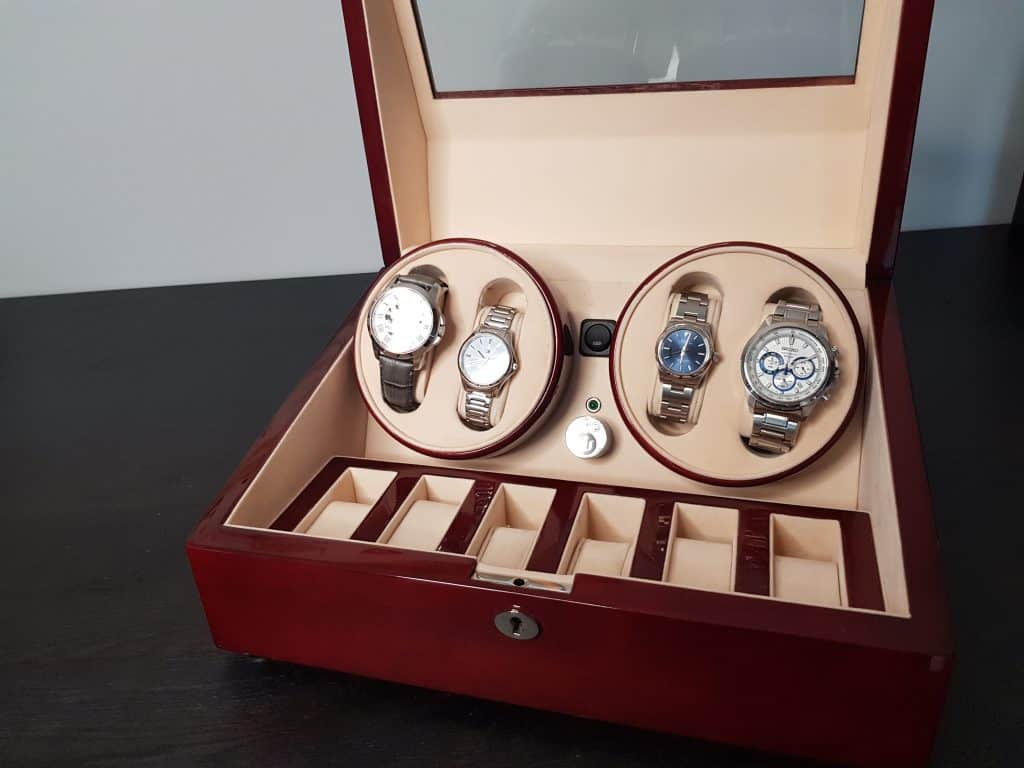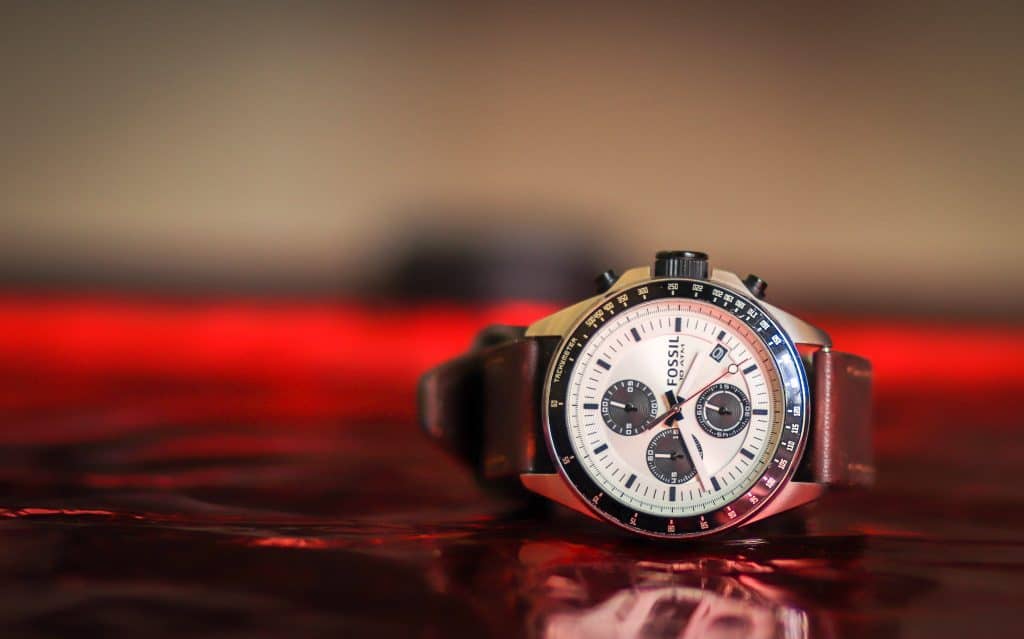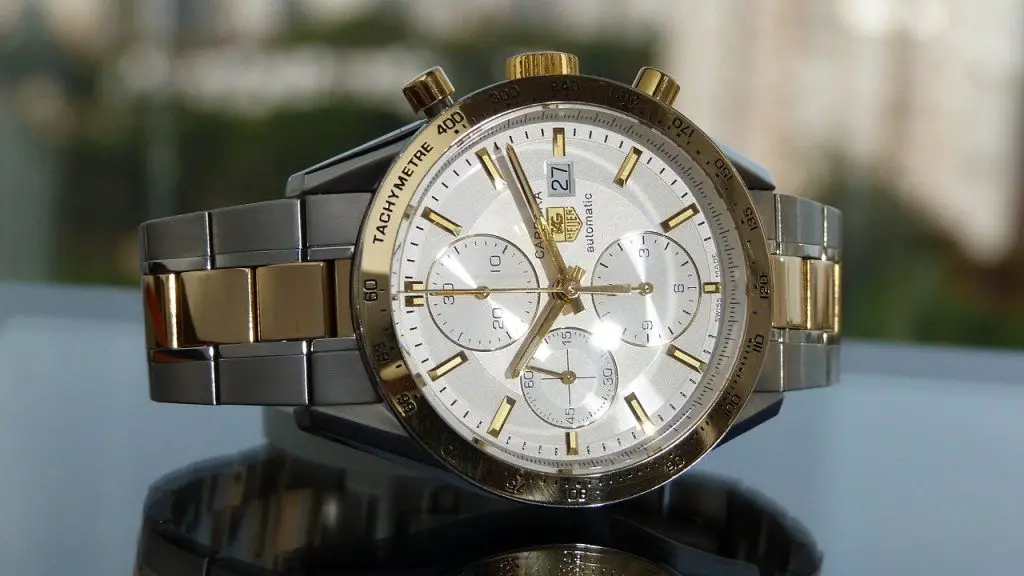As a dedicated owner, protecting your watch from any harm is part of your daily life. Watch winders are somewhat controversial in that regard. Many see and know the upsides, but some are worried that they also cause harm to the watch. One of the things that would harm the watch is magnetization, but can a watch winder actually magnetize a watch?
Quality watch winders are equipped with a shield that absorbs the magnetic field, making the chances of magnetization slim. The shield helps prevent any magnetic forces from reaching the mainspring and affecting the internal functioning of the watch. Cheap or incompatible watch winders, in contrast, could magnetize the watch.
There are different ways in which magnetization can reach and affect your beloved timepiece. The purpose of this post is to help you gain a thorough understanding of this crucial topic and let you know all the in’s and out’s of magnetizing a watch.

Table of Contents
Watch Winders And Magnetization: An Explanation
Watches use metal materials in their structure, and just as any other metal, they could get magnetized when exposed to magnetic forces. Magnetization could cause different problems to the inner functioning of a timepiece and for that, it is crucial to be careful with it.
A watch winder, with all its usefullness, it something that could actually magnetize a watch. Although it is true that winders could create a magnetic field, it is not as dangerous as you might think.
The inner mechanism of watch winders uses an electric motor and a magnet. When these two components operate together, they can create a small magnetic field. Although magnetization could happen, quality watch winders come with a protective anti-magnetic shield to prevent it.
If you decided to buy a cheap watch winder, you might be looking at a higher risk of magnetization. Low-quality winders don’t always have the necessary protective technology to prevent your watch from becoming magnetized.
The protective shield inside the watch winder consists of a metal frame capable of absorbing the magnetic force. Hence, when a watch winder lacks this anti-magnetic protection, the small field of energy could reach the mainspring of the watch, causing damage.
With high-quality winders, the risk of magnetization is considerably lower. Manufacturers are aware of the problems magnetization could cause, so they include all the necessary precautions in their high-end products.
On the other hand, most high-end watches also come with some sort of magnetization protection. These luxury watches are expensive and expertly crafted, ensuring you get the best-possible timepiece there is. With that comes some sort of protection, especially seeing that in today’s world, there are so many things that can cause some sort of magnetization.
Using a quality watch winder, with the added protection, you can rest easy knowing that your winder will probably not magnetize your watch. Of course, it can always happen, but it’s very unlikely. Still, if you notice your watch is off slightly, it’s best to test the timepiece and winder for magnetization, just in case.
To test your watch (winder) for magnetization, you can put a needle compass near your watch winder. If the winder doesn’t attract the needle, your winder is most likely free from any magnetic field.
What Happens When A Watch Is Magnetized?

Out of a sudden, your watch is running faster than usual. To worsen things, the problems develop by the day, and you can see your timepiece ten minutes ahead of the correct time. If this sounds like your case, your watch is probably magnetized.
Magnetized watches lose their accuracy and their timekeeping capabilities. Magnetization causes the inner parts of the timepiece to become sticky and jumpy, thus altering the time. The balance spring sticks, the balance wheel becomes unregulated, and the watch becomes inaccurate.
When the balance wheel and the hairspring stick, the balance wheel loses its functionality. If there is no balance, there is nothing keeping the watch from running wild. This speed change happens when the magnetic field causes the individual coils of the balance spring to stick. The balance spring becomes shorter, causing the piece to run faster.
These inaccuracies might seem harmless, but they continue to increase. What seems like a couple of seconds today can become a few minutes tomorrow. If you let this continue, you could even end up with inaccurate hours.
Depending on the parts affected, a magnetized watch could run not faster but slower as well. And in some extreme cases where the magnetic field is extremely strong, timepieces could even stop working completely.
Whether faster, slower or stopped, the watch needs to be demagnetized before it can work properly again.
Luckily, magnetization has a solution, and it is a quick and easy one. Demagnetizing doesn’t even require the watch to be opened. With the correct tools and the proper knowledge on how to do it, this is a simple process.
What To Do When Your Watch Is Magnetized?
Watches need to be demagnetized to restore their accuracy. This process can be done at repair centers, by jewelers, or at home with the proper equipment. Nowadays, there are demagnetizing machines that can fix this problem in a few minutes.
Sending your watch to a repair center or to a local jeweler is probably the best option. The professionals can take care of your watch with great ease, and the cost of this repair is not too high. The only downside is that it could take some time before you get your watch back.
The process itself is quick, but the waiting can increase if the repair center is away from your city. Can you imagine sending your watch overseas for a repair that takes just a couple of minutes?
Nowadays, there is a wide variety of demagnetizing machines on the market at affordable prices. Most demagnetizers cost less than 30$ and are simple to use. You just need to place your watch on top of the machine, press a button, and wait for the magic to happen.
This option is considerably faster than having your watch sent to a repair center. In just a few minutes, you can have your watch demagnetized at home. Buying one of these machines will be especially beneficial for you if you have more than one automatic watch. A demagnetizer will help you protect all of your watches by getting them rid of any magnetic field.
Just keep in mind that trying to fix your watch yourself could void the warranty. When fixing the problem by yourself, you could do something wrong and break something inside of the watch. If that happens, you’d need to have that repaired, and because you broke it yourself, not all manufacturers will honour the warranty after that.
How To Know If Your Watch Is Magnetized?

Although it seems like the symptoms will make it really easy to diagnose a watch of magnetization, there are some tools you can use to be sure. To give the proper treatment to your timepiece, confirming the magnetization is for the best.
To know if your watch is magnetized you can place it near a needle compass. If the needle moves, your watch is probably magnetized. There are other tests you can do with certain apps. These apps use the magnetic field of phones to diagnose magnetization.
Magnetization is the most common cause of inaccuracy in automatic watches. However, there are some other agents that could cause a watch to run slower or faster. If a watch is, for instance, in need of servicing, it may become inaccurate. Temperature can also affect the accuracy of a watch.
With this in mind, it is crucial to diagnose the watch correctly to attack the problem at its source.
Using a compass to check if the watch has been magnetized is the most practical option. Just put the compass next to your watch, and you can test this. If the timepiece attracts the needle of the compass, you know for sure that your timepiece is magnetized.
The other alternative is to use an app. For IOS users, the app Lepsi can diagnose your watch with just a few touches. Apart from this one, there are many other apps that can do this for you. Go to the app store and pick yours!
What Other Items Can Magnetize My Watch?
Magnetization is a common problem due to the many magnetic fields around nowadays. When a timepiece is near a magnetic force, it could get magnetized. Phones, MRI machines, airport scanners, and even magnet clasps can magnetize a timepiece.
The longer the contact with magnets, the stronger the effects. Passing rapidly through a scanner is unlikely to cause any problems with your timepiece. The problems come when the watch receives too much magnetic force from a device for a sustained time. Coming back to watch winders, your watch is spending a long time inside the winder and could be exposed to a magnetic field for a little too long.
One very common case is putting your watch on top of your phone. The magnetic field of the phone is sure to magnetize your watch if left there for too long. Do you do this on your nightstand? You might want to reconsider it!
Other items such as speakers, computers, and microwaves can also magnetize your watch. In most cases, your timepiece will not be affected by a single contact unless the magnetic field is extremely strong, but it’s always good to know that these everyday items could have an impact, however little.
The repeated contact with these items can progressively magnetize your watch. You should try to keep your timepiece away from any device that produces strong magnetic forces. Your watch is more likely to get magnetized in your daily life than inside the watch winder.
All in all, magnetization is fairly rare and chances are it won’t happen to you that often, if ever. But taking a few small steps to avoid it from happening in the first place will never hurt!
